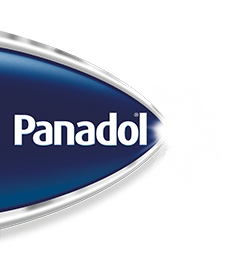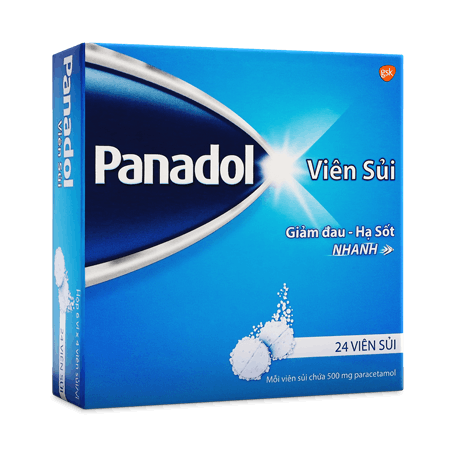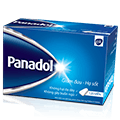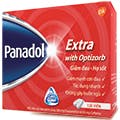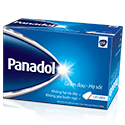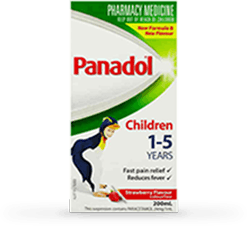

Panadol

Panadol Extra

Panadol Viên Sủi

Panadol Cảm Cúm

Panadol Extra with Optizorb
So sánh (0/5)
- Sản phẩm
- DẠNG BÀO CHẾ
- Tuổi
- CHỨC NĂNG CHÍNH
- Thành phần

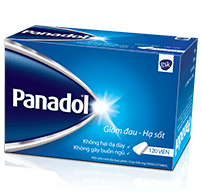
Panadol
- Viên nén
- 12+ TUỔI
- Giảm đau - Hạ sốt
- 500 mg Paracetamol


Panadol Extra
- VIÊN NÉN
- 12+ TUỔI
- Giảm mạnh các cơn đau – Hạ sốt
- 500 mg Paracetamol
- 65 mg Caffeine


Panadol Viên Sủi
- VIÊN SỦI
- 12+ TUỔI
- Giảm đau - Hạ sốt nhanh
- 500 mg Paracetamol


Panadol Cảm Cúm
- VIÊN NÉN
- 12+ TUỔI
- Giảm triệu chứng cảm cúm
- 500 mg Paracetamol
- 25 mg Caffeine
- 5 mg Phenylephrine Hydrochloride

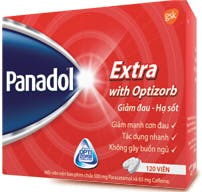
Panadol Extra with Optizorb
- VIÊN NÉN
- 12+ TUỔI
- Giảm mạnh các cơn đau – Hạ sốt
- 500 mg Paracetamol
- 65 mg Caffeine
Minimise
Headache & Migraine
Headaches can be dull and throbbing, sharp and pinpointed, and can last for a few minutes or a few days. There are three main types of headaches: tension, migraine and cluster headaches. Each may have its own causes and different symptoms. Migraine headaches differ from tension headaches in that the pain is usually restricted to one side of the head, and may be described as throbbing, moderate to severe pain.
See All Headache Products
Which Type Of Headache Is Causing You Pain?
Tension Headaches
Tension headaches are one of the most common types of headache. They can be caused by a tightening of the muscles of the neck and scalp. This muscle constriction may be triggered by physical or environmental factors, including stiffness in the shoulder and neck muscles as a result of stress or poor posture.

Tension headaches can:
- result in mild-to-moderate pain and feel like a tight band of pressure around the head
- be felt equally on both sides of the head, and are normally short lived
- be uncomfortable and annoying. However, they are generally not severe enough to prevent daily activities such as walking
Migraine Headaches
Migraine headaches differ from tension headaches in that the pain is usually restricted to one side of the head and may be described as throbbing, moderate or severe. Many migraine sufferers may become temporarily sensitive to light and noise, and may also experience nausea and vomiting.

Migraine headaches can:
- last from a few hours to a few days and attacks can be reoccurring
- be more common in women than men
- be caused by various triggers and vary from person to person
Fortunately, identifying and managing these triggers can substantially reduce the number of migraines.
Cluster Headaches

Cluster headaches are the least common type of headaches, but arguably the most intense, and men are more likely to suffer from them than women. The “cluster” in cluster headaches refers not to the location of the head pain, but rather to the grouping of the attacks over time. This is the main difference between cluster headaches and tension or migraine headaches—cluster headaches regularly recur over a certain period of time.

Cluster headaches can:
- bring intense pain, which is usually described as excruciating and localised to one eye
- affect one side of the head, around and behind the eye, then worsen and may last from 15 minutes to three hours
- include symptoms such as eye swelling, tearing and redness and blocked or runny nose only on the side of the head that is affected
Related Articles

Causes, symptoms and treatments for Osteoarthritis
Many people suffer from a type of arthritis -- including men and women, older people and even children.

Causes, symptoms and treatments for Osteoarthritis
Many people suffer from a type of arthritis -- including men and women, older people and even children.

Causes, symptoms and treatments for Osteoarthritis
Many people suffer from a type of arthritis -- including men and women, older people and even children.

Causes, symptoms and treatments for Osteoarthritis
Many people suffer from a type of arthritis -- including men and women, older people and even children.
